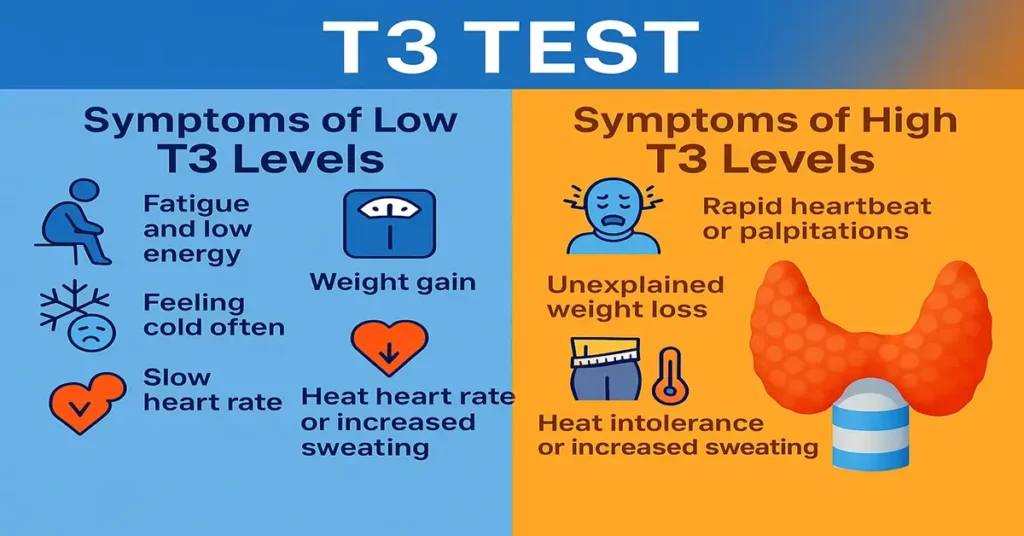Overview
The T3 Test measures the level of Triiodothyronine (T3), one of the two main hormones produced by your thyroid gland (the other being T4 or Thyroxine).
T3 is the active form of thyroid hormone and plays a vital role in regulating metabolism, energy production, and overall body function.
Doctors recommend this test to evaluate thyroid function — particularly to detect hyperthyroidism (overactive thyroid) or monitor ongoing thyroid treatment.
T3 exists in two forms:
- Total T3: Includes both protein-bound and free T3.
- Free T3: Measures only the active T3 circulating freely in the blood, which is available to the body’s tissues.
Where is T3 Produced in the Body?
T3 is produced both by the thyroid gland and by conversion of another hormone (T4) in different organs.
- Around 20% of T3 is directly secreted by the thyroid gland.
- The remaining 80% is formed in the liver and kidneys, where T4 (Thyroxine) is converted into T3 through enzymatic activity.
This balance ensures that enough active thyroid hormone is available to regulate metabolism and cellular activity throughout the body.
Main Functions and Importance of T3
T3 is the most biologically active thyroid hormone and is essential for maintaining the body’s energy, temperature, and metabolism.
Key Functions:
- Regulates Metabolism
Controls how the body uses fats, proteins, and carbohydrates for energy. - Controls Body Temperature
Helps maintain body heat by stimulating cellular energy production. - Supports Heart and Muscle Function
Regulates heart rate, muscle tone, and overall circulation. - Affects Brain Function and Mood
Plays a major role in brain development, mental alertness, and mood regulation. - Supports Digestive and Reproductive Health
Maintains healthy digestion, appetite, and reproductive hormone balance. - Boosts Oxygen Use
Helps cells use oxygen efficiently to produce energy (ATP).
In simple words — T3 is like your body’s “energy accelerator” that keeps metabolism running at the right speed.
Causes of Low T3 Levels
Low T3 levels, also known as hypothyroidism, indicate that your thyroid is not producing enough active hormone.
It can also result from health conditions that slow conversion of T4 to T3.
Common Causes:
- Hypothyroidism (underactive thyroid gland)
- Pituitary gland disorders (low TSH production)
- Chronic illnesses (like kidney or liver disease)
- Sick euthyroid syndrome (seen during severe illness, where thyroid function is normal but T3 is low)
- Severe malnutrition or fasting
- Certain medications (steroids, lithium, beta-blockers)
Symptoms of Low T3 Levels
When T3 is low, your metabolism slows down. This causes a variety of symptoms that affect energy, skin, digestion, and mood.
- Fatigue or low energy
- Unexplained weight gain
- Feeling cold more often
- Slow or irregular heartbeat
- Constipation
- Dry skin and hair loss
- Depression or low mood
- Menstrual irregularities in women
- Puffy face or swelling in hands and feet
If untreated, low T3 can cause severe hypothyroidism or myxedema, a life-threatening condition.
Causes of High T3 Levels
High T3 levels, known as hyperthyroidism, occur when your thyroid gland is overactive or when excess thyroid hormone enters the bloodstream.
Common Causes:
- Hyperthyroidism (overactive thyroid gland)
- Graves’ disease (autoimmune disorder that overstimulates the thyroid)
- Toxic multinodular goiter (thyroid nodules that produce excess hormone)
- Thyroiditis (thyroid gland inflammation)
- Excess thyroid hormone medication
- Rare hormone-secreting tumors
Symptoms of High T3 Levels
High T3 speeds up metabolism excessively, making the body overactive and stressed.
- Rapid heartbeat or palpitations
- Anxiety, nervousness, or irritability
- Unexplained weight loss despite good appetite
- Heat intolerance or excessive sweating
- Tremors in hands or fingers
- Frequent bowel movements or diarrhea
- Insomnia or trouble sleeping
- Menstrual irregularities
- Fatigue despite adequate rest
Severe hyperthyroidism can lead to thyroid storm, a medical emergency.
Reference Ranges
Note: Reference values may differ slightly between laboratories.
| Test Type | Normal Range |
|---|---|
| Total T3 | 80 – 200 ng/dL |
| Free T3 | 2.3 – 4.2 pg/mL |
- Low T3 → Hypothyroidism or severe illness
- High T3 → Hyperthyroidism or Graves’ disease
Sample Type and Testing Information
- Sample Type: Serum (blood)
- Tube Used: Red Top (Plain)
- Fasting: Not always required, but avoid testing immediately after taking thyroid medication.
- Related Tests: TSH, Free T4, Total T4
Blood is drawn from a vein in your arm, and results are typically available within 24 hours.
Test Preparation
- Do not take thyroid medication before the test (unless instructed).
- Avoid supplements containing biotin for 2–3 days prior (as it can affect results).
- Inform your doctor if you are pregnant or taking steroids, beta-blockers, or lithium.
- No fasting is required unless combined with other tests.
When to Consult a Doctor
See your doctor if you notice:
- Unexplained weight loss or gain
- Irregular heartbeat or fatigue
- Anxiety, restlessness, or depression
- Feeling unusually hot or cold
- Hair loss or dry skin
- Irregular menstrual cycles
If your T3 test results are abnormal, your doctor may recommend additional thyroid tests (TSH, T4, or antibody tests) to find the root cause.
Important Word Explanations
| Word | Meaning |
|---|---|
| Thyroid gland | Butterfly-shaped gland in the neck that regulates metabolism. |
| T3 (Triiodothyronine) | Active thyroid hormone that controls body metabolism. |
| T4 (Thyroxine) | Precursor thyroid hormone that converts to T3 in the body. |
| TSH (Thyroid-Stimulating Hormone) | Hormone from the pituitary gland that regulates thyroid hormone production. |
| Hyperthyroidism | Condition when the thyroid produces too much hormone. |
| Hypothyroidism | Condition when the thyroid produces too little hormone. |
| Graves’ Disease | Autoimmune disorder that causes hyperthyroidism. |
~END~

